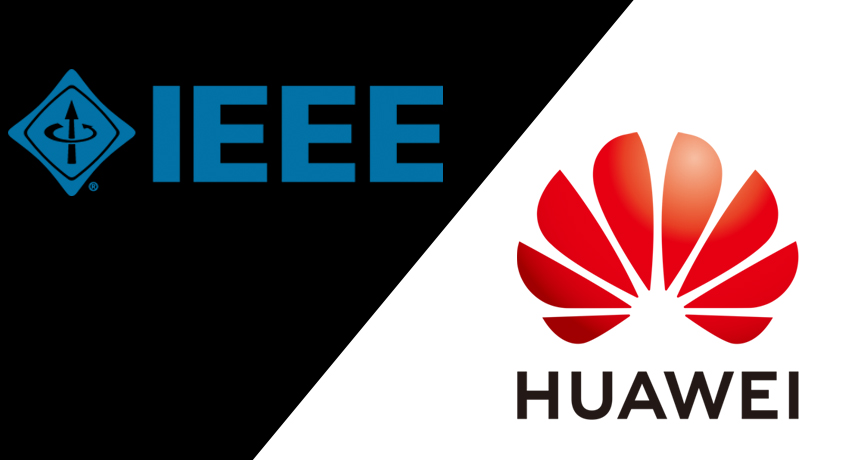“Compliance with U.S. Trade Restrictions Should have Minimal Impact on IEEE Members Around the World” – Read the full statement by IEEE
The article below was published at Techcrunch
The IEEE’s ban on Huawei following new trade restrictions in the United States has sent shock waves through global academic circles. The organization responded saying the impact of the trade policy will have limited effects on its members, but it’s hard at this point to appease those who have long hailed it as an open platform for scientists and professors worldwide to collaborate.
Earlier this week, the New York-headquartered Institute of Electrical and Electronics Engineers blocked Huawei employees from being reviewers or editors for its peer-review process, according to screenshots of an email sent to its editors that first circulated in the Chinese media.
The IEEE later confirmed the ban in a statement issued on Wednesday, saying it “complies with U.S. government regulations which restrict the ability of the listed Huawei companies and their employees to participate in certain activities that are not generally open to the public. This includes certain aspects of the publication peer review and editorial process.”
In mid-May, the U.S. Department of Commerce’s Bureau of Industry and Security added Huawei and its affiliates to its “Entity List,” effectively barring U.S. firms from selling technology to Huawei without government approval.
It’s unclear what makes peer review at the IEEE a technology export, but the science association wrote in its email to editors that violation “may have severe legal implications.”
Whilst it’s registered in New York, the IEEE bills itself as a “non-political” and “global” community aiming to “foster technological innovation and excellence for the benefit of humanity.”
Despite its removal of Huawei scientists from paper vetting, the IEEE assured that its compliance with U.S. trade restrictions should have “minimal impact” on its members around the world. It further added that Huawei and its employees can continue to participate in other activities as a member, including accessing the IEEE digital library; submitting technical papers for publication; presenting at IEEE-sponsored conferences; and accepting IEEE awards.
Read the full article by Rita Liao at TechCrunch
Read below the statement from IEEE
IEEE would like to clarify our response to recent additions to the U.S. Export Administration Regulations and what they mean to IEEE members worldwide, including those in China.
On Thursday, May 16, 2019, the U.S. Department of Commerce’s Bureau of Industry and Security (“BIS”), which administers and enforces the U.S. Export Administration Regulations (“EAR”) specifically added Huawei Technology Ltd. and 68 of its affiliates (referred to collectively as “Huawei” in the following paragraphs) to the BIS “Entity List” found in Supplement No. 4 to EAR Part 744. Violations of the EAR carry significant civil or criminal penalties, including fines or prison sentences.
IEEE offers a wide range of activities and benefits for its members, volunteers and the wider technical community, including sponsoring more than 1,900 annual conferences and events worldwide and providing access to over 4.8 million publications on IEEE Xplore®. These services remain open to all, no matter their employer.
In providing these services (as a non-political, not-for-profit organization registered in New York) IEEE must comply with its legal obligations under the laws of the United States and other jurisdictions. Compliance with these regulations protects IEEE, our volunteers, and our members.
IEEE complies with U.S. government regulations which restrict the ability of the listed Huawei companies and their employees to participate in certain activities that are not generally open to the public. This includes certain aspects of the publication peer review and editorial process.
However, all IEEE members, including those employed by Huawei, can continue to participate in individual membership, corporate membership and voting rights; subscribe to and access IEEE’s digital library and other publication products; submit technical papers for publication; participate in and present at IEEE-sponsored meetings and conferences, and may sponsor and accept an IEEE award. Members affiliated with Huawei may also participate in business, logistics, and other meetings including those related to conference planning.
Huawei and its employees can continue to be a member of the IEEE Standards Association, including earning or exercising the voting rights of membership; attend IEEE standards development meetings, submit new proposals for standards, and participate and comment in public discussions of standards technology proposals.
Should the U.S. government clarify the application of the EAR with respect to peer review we will further advise the IEEE community.
IEEE is proud of the work our members do all over the world and we are committed to advancing technological innovation and excellence for the benefit of humanity.

